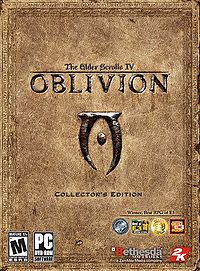Oblivion:About

The Elder Scrolls IV: Oblivion is the fourth installment in Bethesda Softworks's The Elder Scrolls series of Computer Role-Playing Games (CRPGs). According to the developers, the game is one "where you could be whoever you wanted and do whatever you wanted".
Contents
Gameplay[edit]
The game takes place on the fictional planet of Nirn, in the Imperial province of Cyrodiil, the capital of the Empire of Tamriel. The interactive environment is made up of fantastical creatures, magic, medieval-style combat, and endless adventure and exploration. No particular role is forced on you; rather, it is up to you to decide whether to become a virtuous hero, an evil overlord, or anything in between. Your character's reputation is determined by their actions, behavior, and dialogue choices throughout the game.
The main story begins with your character locked up in the Imperial prison. You learn that the emperor—Uriel Septim VII—is the target of a powerful group of cultist assassins. As the emperor rushes to escape the city with his guards, he enters your cell and uses a secret passage located within. The assassins follow and manage to murder the emperor. With his dying breath, the emperor pardons your unknown crimes and gives you his amulet—which can only be worn by his heir—and a task: to "close shut the jaws of Oblivion". You are now free, but not without some disheartening knowledge: the gates of Oblivion will open, and chaos and destruction will spread across Cyrodiil unless they can stop it.
You can also choose to join multiple factions separate from the main storyline, specifically the Fighters Guild, Mages Guild, Thieves Guild, and Dark Brotherhood. Each faction offers room and board, services, and other useful benefits to its members, and by performing quests for a faction, you can rise in its ranks, even becoming the leader of that faction.
Countless quests send you across a vast, richly detailed landmass complete with cities, villages, harbors, ruins, dungeons, and a variety of wilderness locales in between.
One of the more enticing features of Oblivion is that, even after all quests have been completed in all ways possible, and everything has been explored (which can be expected to take around 300 hours), gameplay can be extended with expansion "mods". Bethesda has released nine official downloads and one full expansion for Oblivion. In addition, PC players have access to countless third-party mods created by other Elder Scrolls fans. The game's Construction Set allows anyone to expand the game world with new lands and quests and the creation of new items and characters.
Availability[edit]
The game was originally released on March 20, 2006 for two platforms: PC and Xbox 360. A year later, on March 20, 2007, it was also released for the PS3. Gameplay on all three platforms is fundamentally similar: the quests, places, items, and characters are the same. Most information on this site is equally applicable to anyone playing the game. The main differences are in add-ons to the game:
- The PC provides access to a Console and Construction Set that allow gameplay to be modified, and also allows the installation of third-party mods; neither the Xbox 360 nor PS3 versions of the game have access to these features.
- The PS3 version of the game comes with Knights of the Nine already included; Xbox 360 and PC players will have to purchase that download separately.
- The other eight official downloads are not available on PS3, but are all available on both Xbox 360 and PC.
- The Shivering Isles expansion is available on all three platforms.
The game was originally rated T (Teen, 13+) by ESRB. However, on May 3, 2006, it was re-rated to M (Mature, 17+) due to various factors, including nudity that could be exposed using third-party mods. Other than the box cover, there is no difference between the original T and the subsequent M version of the game.
The version number of the original game was 1.0.228. Two main patches were subsequently released to fix issues, including game-crashing bugs and exploitable glitches: version 1.1.511 (version 1.1) was released on June 6, 2006; Version 1.2.0214 (version 1.2) was released on March 23, 2007. The discovery of the Reference Bug necessitated a final patch to fix that one issue, Version 1.2.0416 (version 1.2.1) released on April 30, 2007. The full-length version names are those displayed on the PC whereas the shorter names are those displayed on Xbox 360.
A Game of the Year (GotY) edition of Oblivion was released on September 10, 2007 (for PC and Xbox 360; October 16 2007 for PS3). The GotY version of the game is the equivalent of the original, patched to version 1.2.1 with the addition of the Knights of the Nine download and the Shivering Isles expansion. The other eight official downloads are not included in the GotY edition.
As of June 16, 2009, the Oblivion GotY edition can be downloaded from Steam. A deluxe edition that includes all official downloads is also available.
The Fifth Anniversary Edition was released on June 12, 2011. Only 200,000 copies were made available. This version comes with a Game of the Year edition of the game, a map of Cyrodiil and the Shivering Isles, a "Making of Oblivion" DVD (the same DVD included with the Collector's Edition with an added Skyrim trailer), and, in the North American edition, a coupon to buy Skyrim slightly cheaper.
Development[edit]
Development on Oblivion started shortly after Morrowind's release in 2002. The release date was originally set for the holidays 2005. Bethesda Softworks delayed the release of the game until early 2006 to fix minor bugs and polish the game. It was shipped on March 20, 2006.
See Also[edit]
- Bethesda's original press release, from October 2004
- A pre-release overview of Oblivion from Executive Producer Todd Howard
- Wikipedia's article on Oblivion
- Oblivion manual (.pdf)
- Oblivion official strategy guide
